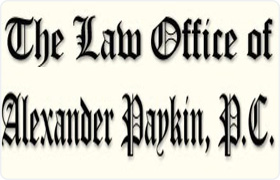Elmont Landlord-Tenant Lawyer, New York
Sponsored Law Firm
-
 x
x

Click For More Info:
-
The Law Office of Alexander Paykin, P.C.
350 5Th Ave Fl 59 New York, NY 10118» view mapReal Estate Reliable. Dependable. Accessible.
Whether you are buying, selling, renting, or refinancing your house, our experienced legal team will strongly advocate for you at each and every step of the process.
800-747-9261
Christopher Michael Lynch
✓ VERIFIED *Status is reviewed annually. For latest information visit hereLawsuit & Dispute, Motor Vehicle, Accident & Injury, Car Accident, Landlord-Tenant
Christopher M. Lynch has been a practicing attorney since January of 2011. In that time he has zealously advocated for his clients and has guided them... (more)
Sean P. Lenihan
Bankruptcy, Family Law, Landlord-Tenant, Litigation
Status: In Good Standing *Status is reviewed annually. For latest information visit here
Jjais A. Forde
Real Estate, Landlord-Tenant, Foreclosure, Land Use & Zoning
Status: In Good Standing *Status is reviewed annually. For latest information visit here
FREE CONSULTATION
CONTACTCatherine Camarda
Landlord-Tenant, Real Estate, Immigration, Accident & Injury
Status: In Good Standing *Status is reviewed annually. For latest information visit here Licensed: 32 Years
John Bianco
Landlord-Tenant
Status: In Good Standing *Status is reviewed annually. For latest information visit here Licensed: 35 Years
Daniel Roskoff
Real Estate, Employment Discrimination, Landlord-Tenant, Personal Injury
B. Mitchell Alter
Landlord-Tenant
Status: In Good Standing *Status is reviewed annually. For latest information visit here
Craig D. Zim
Landlord-Tenant
Status: In Good Standing *Status is reviewed annually. For latest information visit here
 Alexander Paykin New York, NY
Alexander Paykin New York, NY AboutThe Law Office of Alexander Paykin, P.C.
AboutThe Law Office of Alexander Paykin, P.C. Practice AreasSpecializations
Practice AreasSpecializations
